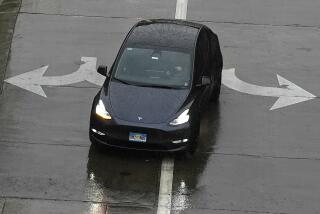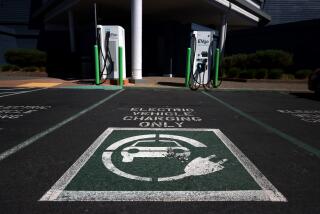Gas-Electric Cars May Be Right Mix for U.S. Drivers
Electric vehicles have failed to spark consumer interest, but the outlook is far more promising for hybrid cars that use both gasoline engines and electric motors, a new study indicates.
The first hybrids, from Honda Motor Co. and Toyota Motor Corp., will hit the U.S. market late this year and next summer. And in the first independent measurement of public interest in the cars, market researchers at J.D. Power & Associates have found that 33% of California new-car buyers and 18% of car buyers nationally would like a hybrid gas-electric power plant in their next vehicle.
That compares with just 9% nationally--15% in California--who said they would like an all-electric propulsion system.
The dismal performance of electric cars so far--fewer than 2,500 have been sold or leased nationwide in three years--shows that what people say in surveys doesn’t always translate into action in the marketplace.
Still, the J.D. Power survey indicates that consumers are far more aware and accepting of hybrids than they have been of electrics, said Jacques daCosta. the company’s product research manager.
Even environmentalists long dismayed by the auto industry’s performance on “green” issues are heartened by the numbers.
“This is very exciting,” said Roland Hwang, the transportation programs director for the Union of Concerned Scientists in Berkeley.
“I think that it points out not only a high awareness of these hybrid vehicles but shows there is a high level of consumer awareness that cars and light trucks are a big source of air pollution.
“It’s a very heartening sign that individuals are willing to do something about it if given the chance.”
The Power survey of more than 20,000 new-car buyers is part of a just-released broader study of consumer acceptance of automotive features and technologies. It found that, on average, respondents would be willing to pay a premium of $1,000 to $1,200 a vehicle to get gas-electric hybrid power plants.
“If just a fraction of those people step forward, the hybrid should be off to a good start,” American Honda Motor Co. spokesman Art Garner said.
Honda, which recently shocked the industry by pronouncing battery-powered electric cars a failed experiment and ceasing production of its EV Plus model, plans to begin selling a two-seat hybrid throughout the U.S. by the end of the year.
Toyota, which has been selling a five-seat hybrid sedan in Japan since 1998, will bring it to the U.S. early next summer. Neither company will disclose sales goals, but both expect their hybrids to do far better than electric cars and said the Power findings were not surprising.
“We like the way their numbers look,” said Jeremy Barnes, Toyota’s environmental programs spokesman. “They speak well for the success of hybrids.”
Electric cars, introduced three years ago by several domestic and Japanese car makers, have failed to catch fire with the public, largely because they depend on storage batteries that have limited range and take a long time to recharge.
The average electric car also leases for about $450 a month, and the few models that can be bought outright cost more than $40,000 after heavy corporate subsidies. By contrast, Toyota’s hybrid Prius sedan is expected to have a base price of $22,000 to $25,000.
Honda has not priced its unnamed hybrid, now code-named the “VV coupe,” but the company is expected to set the base at just under $20,000. While most electrics can travel fewer than 100 miles between charges, Toyota and Honda are claiming ranges of 600 to 700 miles on a tank of gas--60 miles per gallon for the Prius and 70 mpg for the Honda.
Both cars use their small gasoline engines for most purposes, augmenting them with a boost from the electric motor when more power is needed. Whereas the Honda uses its gas engine all the time, the Toyota switches its system off automatically so the car can run as a pure electric at very low speeds and when backing up.






